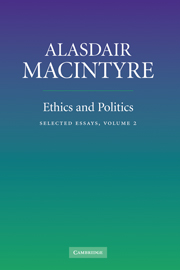Book contents
- Frontmatter
- Contents
- Preface
- Acknowledgments
- PART I LEARNING FROM ARISTOTLE AND AQUINAS
- 1 Rival Aristotles: Aristotle against some Renaissance Aristotelians
- 2 Rival Aristotles: Aristotle against some modern Aristotelians
- 3 Natural law as subversive: the case of Aquinas
- 4 Aquinas and the extent of moral disagreement
- PART II ETHICS
- PART III THE POLITICS OF ETHICS
- Index
3 - Natural law as subversive: the case of Aquinas
Published online by Cambridge University Press: 27 January 2010
- Frontmatter
- Contents
- Preface
- Acknowledgments
- PART I LEARNING FROM ARISTOTLE AND AQUINAS
- 1 Rival Aristotles: Aristotle against some Renaissance Aristotelians
- 2 Rival Aristotles: Aristotle against some modern Aristotelians
- 3 Natural law as subversive: the case of Aquinas
- 4 Aquinas and the extent of moral disagreement
- PART II ETHICS
- PART III THE POLITICS OF ETHICS
- Index
Summary
That the thirteenth century in Europe was a time of extended conflict and debate does not differentiate it from other times and places. But the character and intensity of some of its conflicts and debates are worth remarking, if only because they gave what turned out to be enduring definition to some rival and alternative modes of moral and political thought and action. So if we begin by situating the moral and social thought of Aquinas in the context of such conflicts and debates, rather than – as is usually done – by abstracting it from and ignoring those contexts, we will perhaps be better able to understand its continuing and distinctive relevance. Which conflicts and debates do I have in mind?
They are conflicts between rival claimants to jurisdiction in particular areas and over particular types of issue, second-order conflicts about who has the legitimate authority to resolve a variety of first-order conflicts. Sometimes they are between ecclesiastical and secular authorities, sometimes between one ecclesiastical authority and another or between one secular authority and another. Examples of the former are those between feudal lords or kings and bishops, most notably those between emperor and pope; examples of the latter include those between local feudal lords and royal officials and those between bishops and the superiors of religious houses. A central question characteristically is, to what higher authority, if any, may someone appeal against the verdict of whomsoever it is that locally has the power to impose authority?
- Type
- Chapter
- Information
- Ethics and PoliticsSelected Essays, pp. 41 - 63Publisher: Cambridge University PressPrint publication year: 2006
- 8
- Cited by



